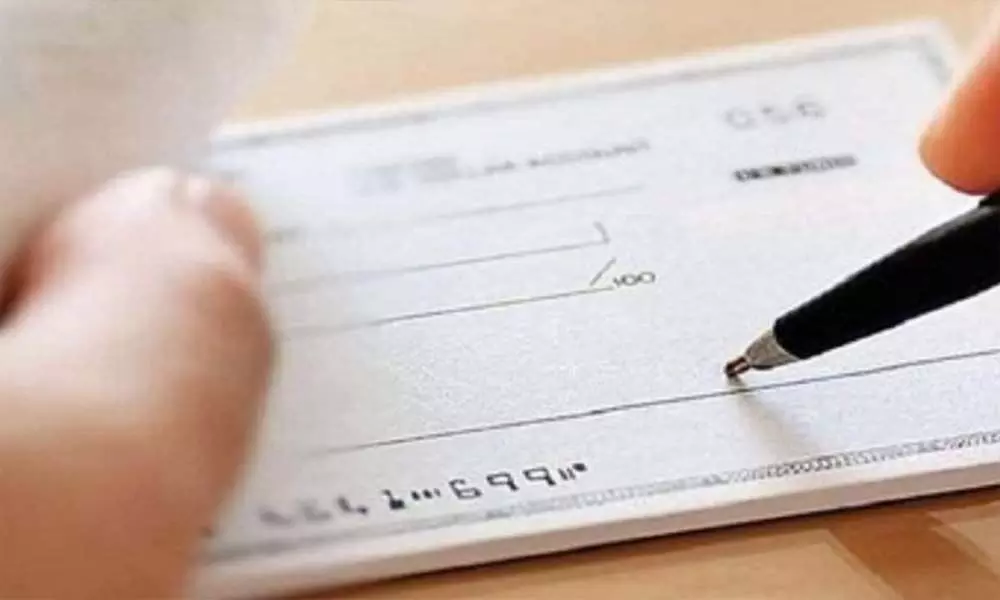Live
- Gadwal BJP Celebrates 75th Anniversary of Indian Constitution with Floral Tributes to Dr. B.R. Ambedkar
- Seal of authenticity for JK crafts by WCC soon
- The online world isn’t always safe
- Markets end in red as weak global cues weigh
- MyVoice: Views of our readers 27th November 2024
- Congress party a victim of its own attitude
- First arrest in RRR Custodial Torture Case: Police arrests Ex-Cop Vijay Paul
- Gukesh claws back with draw against Ding
- BGT: Australia’s top order is major concern, opines Chappell ahead of Adelaide Test
- Hyderabad Police Launch 'Operation Rope' to Address Traffic Issues
Just In

Cheque Clearing System is Changing: Know about the new rules
Cheque Clearing rules: To make cheque transactions safer, the Reserve Bank of India (RBI) has directed all banks to introduce the Positive Pay System (PPS) effective January 1, 2021.
Cheque Clearing rules: To make cheque transactions safer, the Reserve Bank of India (RBI) has directed all banks to introduce the Positive Pay System (PPS) effective January 1, 2021.
PPS enables an additional security layer to the cheque clearing process wherein the cheque issuer submits cheque details as per the process mentioned below. When the beneficiary submits the cheque for clearing, the presented cheque details will be compared with the details provided to the bank through PPS.
Many banks like Axis Bank are informing their customers about the changes and suggesting the changes that should be submitted. Axis Bank in its notification has said "Sharing the cheque details through PPS for cheques amounting to INR 5 lakhs and above has been made mandatory by Axis Bank effective September 1, 2021. In case of non-submission of PPS details by the customers, cheques with value amounting to Rs 5 lakhs and above will be returned to the presenting bank with return reason description "Positive Pay details not available", once the cheque is presented through CTS clearing."
What is PPS?
Developed by the National Payments Corporation of India (NPCI), the Positive Pay System, is a process of reconfirming the key details of large value cheques. Under the system, a person issuing the high-value cheque submits certain essential details of the cheque like date, name of the beneficiary or payee amount among others to the drawee bank. The details can be submitted through electronic means such as SMS, mobile app, internet banking, ATM etc. The details are cross-checked while issuing the cheque and any discrepancy is flagged.
Limit of the amount under the system
The regulator, RBI, has asked the banks to enable the facility for all account holders issuing cheques for amounts of Rs 50,000 and above. It has also been said that while availing of the facility is at the discretion of the account holder, banks may consider making it mandatory in case of cheque values of Rs 5 lakh and above.
Importance of the system for the customers
Some banks have informed their customers that if the details of large-value cheques are not pre-registered, the cheque will be returned. On issuance of a high-value cheque, customers should ensure that details are provided within the timeframe prescribed by the banks for hassle-free clearance. RBI has said only cheques that are registered in the Positive Pay System will be accepted under the dispute resolution mechanism. Customers would get an SMS on whether the cheque is accepted or rejected for any reason.
Cheque details that must be submitted
Account number, cheque number, date of the cheque, amount, transaction code, beneficiary name, MICR CODE.
The process to submit the details
Details can be submitted through the respective bank's website, internet banking or mobile banking. In case a customer does not use electronic banking services, they can submit the details by visiting bank branches.

© 2024 Hyderabad Media House Limited/The Hans India. All rights reserved. Powered by hocalwire.com







